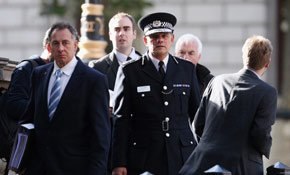John Humphrys asks: have we lost trust in the police?
‘Quis custodiet ipsos Custodes?’ asked the Roman poet, Juvenal. Who is to guard the guards? That’s a question that will be much in MPs’ minds over the next week or so as the House of Commons Home Affairs Select Committee conducts a series of hearings at which police officers are being asked questions about the so-called ‘Plebgate’ affair. But the issue is not confined to one controversial case. The senior Tory MP and former shadow home secretary, David Davis, believes the police are facing a ‘crisis of ethics’ and is calling for a tougher regulator to ‘guard the guards’. Have we lost trust in the police? And, if so, what should we do about it?
It may not seem surprising to those with more cynical minds that it has taken the case of alleged police misconduct regarding a politician to get politicians themselves to kick up a fuss about whether all is right with the police - though, to be fair, some politicians have been expressing concern for years.
‘Plebgate’ has been dragging on for over a year now. The outlines are simple enough. Back in September 2012 the then government chief whip, the Tory MP Andrew Mitchell, had a forty-five second altercation with the police who refused to let him ride his bike through the security gates at the end of Downing Street. He swore at them and it was alleged that he called them ‘plebs’, which he denied.
A month later he met three representatives of the Police Federation in his Sutton Coldfield constituency. After the meeting one of the police officers, Inspector Ken MacKaill of West Mercia Police, said in public that Mr Mitchell had failed to give an account of the incident in Downing Street and called on him to resign from the government. The political pressure proved too much for Mr Mitchell and he did just that.
But doubts persisted about exactly what had happened and the police conducted their own investigation. Eight people, including five police officers, were arrested and bailed. That was a year ago and no one has been charged with any offence. But it emerged recently that, unknown to the three police officers who met Mr Mitchell last October, he made a recording of the meeting. It showed quite clearly that he continues to deny that he had ever used the word ‘pleb’, but he had apologised for his behaviour and provided his own account of what had happened.
This clear evidence contradicting what Inspector MacKaill had said after the meeting led the chief constables of the three police forces from which the Police Federation representatives came to conduct an inquiry as to whether the officers had deliberately tried to discredit Mr Mitchell. They concluded that there was no case to answer with regard to any charge of misconduct.
But the Independent Police Complaints Commission strongly disagreed with this conclusion. Its deputy chair, Deborah Glass, said: ‘In my opinion the evidence indicates an issue of honesty and integrity, not merely naïve or poor judgement.’ The officers involved subsequently expressed regret for what had been said after the meeting but offered no apology. And their bosses continue to refuse to take disciplinary action against them.
This has incensed politicians of all parties from the Prime Minister down. Keith Vaz, the Labour chair of the Home Affairs committee, has called this week’s hearings as a consequence. Nick Herbert, the Tory former police minister, said that the IPCC wording was ‘incredibly strong’. He said: ‘They suggest that the police officers gave a false account, that there was a deliberate attempt to discredit Andrew Mitchell, that their motives seem plain: they were pursuing a political agenda. … It is very unsatisfactory that we have a situation where the leadership of the police force appears to disagree and take no action in spite of the view of the independent body that was set up to deal with complaints.’
Now David Davis has gone even further. In a strongly-worded article in The Times, Mr Davis puts ‘Plebgate’ in the context of what he sees as ‘a long list of police investigations to seek the truth but conducted as clumsy cover-ups’. He cites the case of the Hillsborough tragedy, in which 96 Liverpool football fans died, and after which during the inquiry, South Yorkshire police deleted notes that reflected badly on them. He also gave as examples the Metropolitan Police’s responses to the cases of Jean Charles de Menezes, shot by police who thought him a suicide bomber, and of Ian Tomlinson, who died after being hit by the police during the G20 demonstration in 2009.
But Mr Davis goes beyond accusing the police of simply turning investigations into cover-ups. He writes of ‘a worrying trend of police smearing innocent people to cover their mistakes’. Here he cites not only the de Menezes case but also the police attempt to find ‘dirt’ on relatives of Stephen Lawrence, the black teenager murdered in Eltham twenty years ago.
In response to growing disquiet about the police, Sir Hugh Orde, the chairman of the Association of Chief Constables, has called for a new police ombudsman. But Mr Davis thinks this inadequate. He says that we need ‘not a new regulator but a tougher regulator’. He referred to a recent parliamentary inquiry into the powers of the IPCC that concluded it had ‘neither the powers nor the resources that it needs to get to the truth when the integrity of the police is in doubt.’ Mr Davis thinks parliament must give the IPCC powers to ‘outrank and overrule’ chief constables. In other words, in cases like ‘Plebgate’, chief constables would no longer be able to defy the views of the IPCC.
Mr Davis does not pull his punches. He writes: “This is a crisis of ethics” and he calls on the government to set up a Royal Commission to inquire into the conduct of the police. He also floats the idea that police should wear cameras and carry microphones when on duty so that evidence is always available as to how they carry out their job. In California, he says, such a policy led to a two-thirds’ fall in the use of force by the police over a year; the conclusion being that the police would not have wanted to be caught using the levels of violence they had previously deployed.
Over the next week the police will no doubt give their own account to MPs not only about the handling of ‘Plebgate’ but about the wider issues raised by Mr Davis.
- Is he right to be so concerned about police conduct and are his remedies the right ones?
- If you yourself have had any dealings with the police, what has been your experience?
- Do you believe they behave as well as we have a right to expect?
- And do you think our “guardians” are themselves being “guarded” with sufficient rigour?










